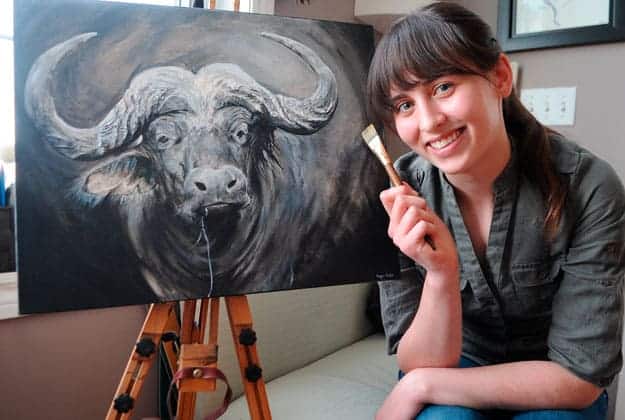Just as the world is said to be divided between Beatles fans and Stones fans, the Looney Tunes pose their own existential challenge. Do you enjoy cheering for an impossibly smooth, endlessly witty operator, or do you more easily identify with a perpetual underdog, always overshadowed by his rivals and easily susceptible to human vices? Should society find a hero to aspire to, or should we celebrate an everyman? Is it rabbit season, or is it duck season?
In short: Bugs or Daffy?

As the Kitchener-Waterloo Symphony prepares a night of Acme-branded tomfoolery with “Bugs Bunny at the Symphony” on May 16, assistant conductor Evan Mitchell takes a more philosophical approach.
“Perhaps this will give you the impression that I’m a person of significant depth: I really admire the relationship between Bugs and Daffy,” said Mitchell. “Very often it’s openly antagonistic. Bugs, obviously the most successful of the Warner Brothers characters, would not be nearly successful if he didn’t have Daffy Duck as his foil.”
Thus, he concludes, “I don’t think I can pick a favourite, because the lunacy of Daffy Duck is weighed by the quiet, clever, sardonic humour of Bugs. And the way that they play off each other, I don’t think either would be as great as they are without the other.”
One can empathize with Daffy’s plight. When he made his debut in 1937’s Porky’s Duck Hunt, Daffy was the brash, young toon on the block, wowing audiences with his ceaseless energy and high-pitched squeals of “Woo woo! WOO WOO Woo woo woo!” Along with his frequent on-screen partner Porky Pig, Daffy ruled the Warner Brothers roost for three years.
But that all changed in 1940 when A Wild Hare introduced audiences to the most famous cartoon rabbit of all time. As adept at befuddling hunters as Daffy ever was, Bugs Bunny had the additional quality of being calm, collected, and cocky. Anchored by a deep moral code (“Of course you know THIS means war!”), Bugs’ torment of Elmer Fudd, Yosemite Sam, et. al. captured the hearts of America, and his rise to stardom was meteoric.
It was around this time that a shift in Daffy’s personality began to occur. No longer the happy-go-lucky duck of 1937, he became more openly exasperated, and frequently contemptuous of his long-eared competition. Perhaps understanding the fleeting nature of stardom, he became obsessed with material possessions (“It’s all mine, ya hear!? Mine mine mine! Down down down!” he said of his treasure in Ali Baba Bunny), and perfectly willing to sacrifice his rival to a hunter’s shotgun (“That, sir, is an in-mitigated frab-rication. It’s wabbit season.”).
For his part, Bugs took a perverse pleasure in poking at Daffy’s insecurities. Their combustible relationship hit its zenith in Duck Amuck (1953), the most avant-garde of the cartoons, in which Daffy finds himself at the mercy of a sadistic animator. First he is a musketeer in 17th century France, but then finds himself in the Alps, and then on a farm, and then a desert island, until finally, the walls of the frame begin literally collapsing on him. Driven mad by this existential strife, Daffy demands to know the identity of his torturer. In the final shot, we learn that it is Bugs. “Ain’t I a stinker?” he confides to the audience.
And so, as the Kitchener-Waterloo Symphony plays musical accompaniment to a full night of classic Looney Tunes animation, audiences will have another chance to contemplate a feud as powerful and enduring as any since the Javert hunted Valjean. In the meantime, can Evan Mitchell at least choose a favourite from the supporting characters?
“Wile E. Coyote, one hundred per cent,” he said, without hesitation. “The Road Runner cartoons are masterpieces of dialogue-less visual comedy … Even though you always know what’s going to happen, you can continue to watch them without it diminishing your enjoyment.”
“Bugs Bunny at the Symphony” will take place at Center in the Square in Kitchener on May 16 at 7 p.m. Tickets range from $15-$42.50 for children, $30-$85 for adults, and are available at tickets.kwsymphony.on.ca. If you walk off the edge of a cliff on your way to the box office, remember not to look down.









